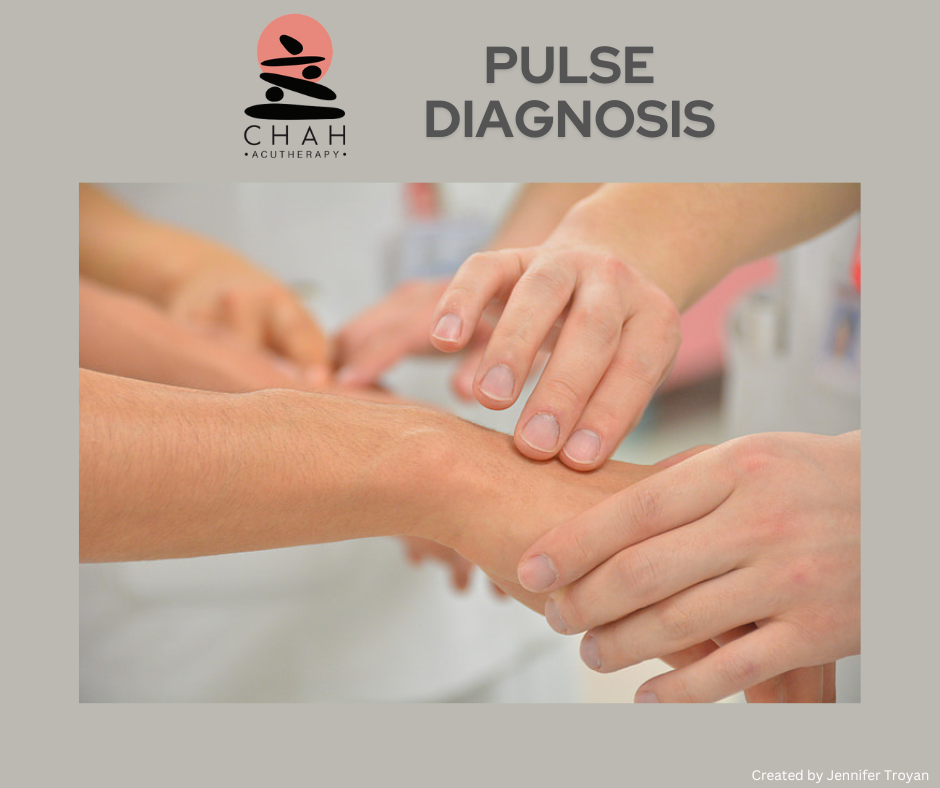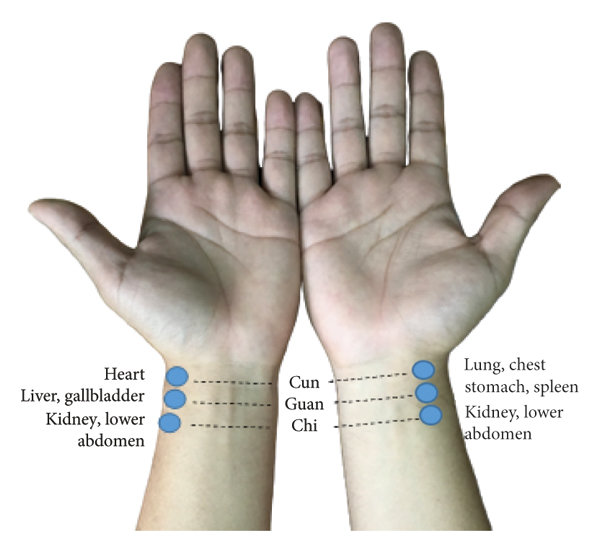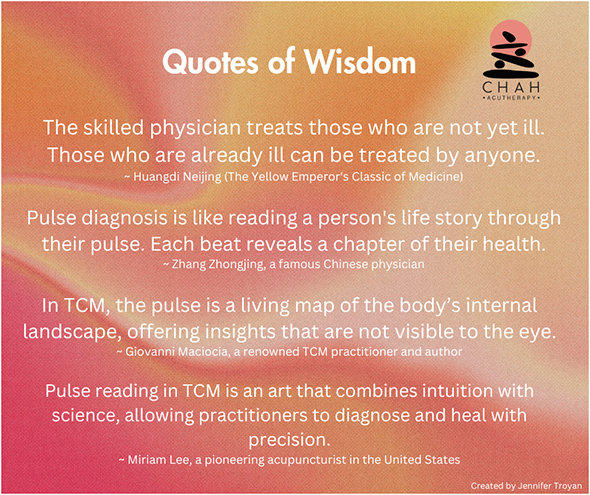
Pulse Activity and its Interpretation
By Maria Chah, DOM, AP & Jennifer Troyan
Introduction
Pulse diagnosis is a fascinating aspect of Traditional Chinese Medicine (TCM) that offers deep insights into a person's health. Unlike the pulse checks you're used to at a regular doctor's office, TCM pulse diagnosis is about understanding the flow of energy and blood in your body. Let's explore this unique diagnostic method and see how it can reveal the state of your overall health.
The Basics of Pulse Positions
When a TCM practitioner checks your pulse, they’re not just counting heartbeats. They’re feeling for specific wave patterns in the blood flow that correspond to different organs in your body.

Pulse diagnosis in TCM illustrating the relationship between radial pulses and the corresponding visceral organs. Right cun (lung, chest); right guan (stomach, spleen); right chi (kidney, lower abdomen); left cun (heart); left guan (liver, gallbladder); and left chi (kidney, lower abdomen).
Image Source: Yu, Wan-Zhen & Huang, Chin-Ming & Ng, Hui Ping & Lee, Yu-Chen. (2021). Distal Acupoints Outperform Proximal Acupoints in Treating Knee Osteoarthritis: A Randomized Controlled Trial. Evidence-Based Complementary and Alternative Medicine. 2021. 1-12. 10.1155/2021/4827123. Wiley Online Library.
Here's a simple breakdown:
- Left Wrist:
- Closest to the wrist (distal):Heart
- Middle position: Liver
- Closest to the elbow (proximal): Kidney
- Right Wrist:
- Closest to the wrist (distal): Lung
- Middle position: Stomach
- Closest to the elbow (proximal): Kidney
These positions help practitioners understand what's going on inside your body by providing clues about your internal organs' health.A great analogy to describe how effective TCM practices are for your organs is this: Organs are so good at targeting issues, that it’s likened to making a special meal for someone. It takes time, focus, precision and care.
What Practitioners Feel For
When your pulse is being read, the practitioner looks for various qualities in the pulse wave, such as:
- Rate and Rhythm: Is it fast, slow, smooth, or choppy?
- Amplitude: Is the pulse strong and easy to feel or weak and faint?
- Temperature: Does it feel warm or cold?
- Vibrations: Are there any unusual patterns?
Each of these factors can tell the practitioner a lot about your health. For example, a strong, pounding pulse might indicate heat in the body, while a weak, thin pulse could suggest a deficiency in energy or blood.
Understanding the Depths
Pulse diagnosis isn’t just about the surface; it also involves three depth levels:
- Superficial: Indicates external conditions like a cold or heat affecting the muscles.
- Middle: Relates to the overall energy (Qi) level.
- Deep: Reflects deeper issues in the organs or bones.
By applying different pressures, practitioners can determine whether a condition is more superficial or deep-seated, guiding their treatment approach accordingly.
How Pulse Diagnosis Helps
Pulse diagnosis works alongside other TCM methods like examining the tongue and looking at the ears. Together, these techniques provide a full picture of your health. The pulse can reveal if there’s an imbalance in your body's energy flow, which might cause symptoms like headaches, digestive issues, or fatigue.
Personalized Treatment
One of the great benefits of pulse diagnosis is that it helps create personalized treatment plans. By understanding your specific pulse patterns, practitioners can recommend the most effective herbs and therapies for your unique condition. This personalized approach is why TCM treatments can be so effective and tailored to individual needs.
Conclusion
Pulse diagnosis is a unique and powerful tool in Traditional Chinese Medicine. It allows practitioners to gain deep insights into your health by feeling the pulse at different positions and depths. This method helps identify imbalances and guide personalized treatments that can improve your well-being.
If you're curious about TCM or looking for a holistic approach to health, visiting a skilled practitioner for a pulse diagnosis can be an enlightening and beneficial experience.

Good health to you all!
--------------------
Information in this article and on this website is intended for informational or educational purposes only. This information does not replace professional medical advice, diagnosis, or treatment. If you have questions about a medical condition, always seek the advice of a doctor or other qualified health professional.
To learn more about our services, please contact our office at 561-249-0447 for a consultation on how to start your annual wellness optimization. During the consultation, we can provide guidance on the best treatment modalities to improve or enhance your state of wellness the TCM way.
Your health team: Chah Acutherapy - We are here for you.
